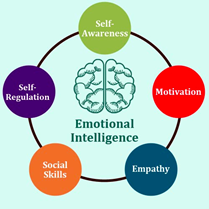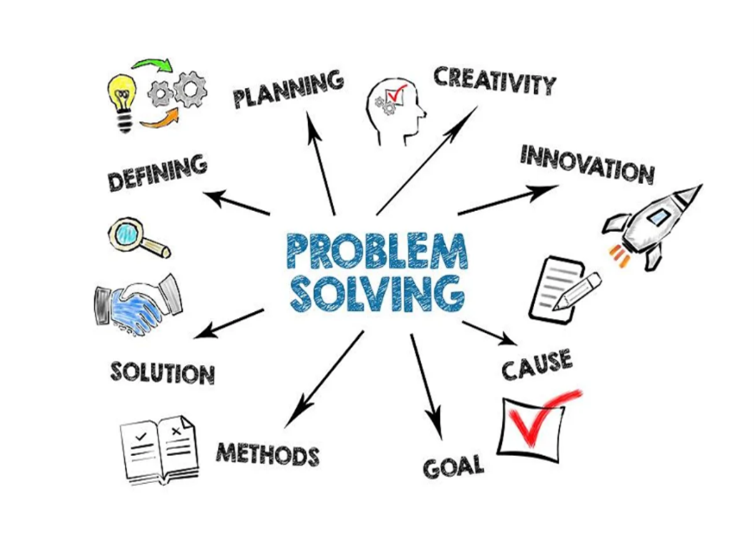The role of emotional intelligence in management.

The role of emotional intelligence in management.
by vivienne 12:32pm Jan 04, 2025

In the fast-paced, competitive world of business, technical skills and strategic thinking have long been regarded as the cornerstones of successful management. However, in the 21st century, a growing body of research shows that emotional intelligence (EQ) is equally, if not more, crucial for effective leadership and management. Emotional intelligence refers to the ability to recognize, understand, and manage one’s own emotions, as well as the emotions of others. For managers, cultivating emotional intelligence can significantly impact their leadership style, team dynamics, and organizational success. Here’s how emotional intelligence plays a vital role in management.
What is Emotional Intelligence (EQ)?
Emotional intelligence is often broken down into five key components:
Self-awareness: Recognizing and understanding one’s own emotions and how they affect thoughts and behavior.
Self-regulation: The ability to control or redirect disruptive emotions and impulses and adapt to changing circumstances.
Motivation: Being driven to achieve for the sake of achievement, with a strong internal drive and focus on goals.
Empathy: Understanding the emotions of others and responding appropriately to them.
Social skills: Managing relationships, inspiring others, and navigating social complexities in both professional and personal settings.
Each of these components plays a crucial role in how a manager interacts with their team, makes decisions, and drives success within an organization. 
1. Enhancing Communication and Relationship Building
One of the most significant roles of emotional intelligence in management is enhancing communication. Managers with high EQ are not only able to express their ideas and expectations clearly but also listen attentively to their team members. This fosters a work environment where open communication is valued, and misunderstandings are minimized.
Key Benefits:
Improved team collaboration: Leaders who are empathetic and attuned to the emotions of their team can build strong relationships, trust, and cooperation.
Conflict resolution: EQ allows managers to address conflicts proactively, understanding the emotions at play and finding solutions that are acceptable to all parties.
Example: A manager with high emotional intelligence may notice that two team members are having a disagreement. Rather than ignoring it, they address the issue calmly, listen to both sides, and mediate a solution that respects each person’s viewpoint, preventing the conflict from escalating.
2. Leadership and Inspiration
Effective leadership goes beyond giving directions and making decisions. Managers must be able to inspire their teams and create an environment where employees feel motivated to do their best work. Leaders with high emotional intelligence can read their team’s emotional states and adjust their approach to match the needs of individuals, whether they need encouragement, a challenge, or recognition.
Key Benefits:
Increased employee motivation: When managers understand and cater to the emotional needs of their team, they are better able to foster a positive work environment that enhances productivity.
Building morale: Empathetic managers recognize and validate the feelings of their team members, helping to keep morale high, especially during difficult times.
Example: A manager with strong EQ might notice that a team member is struggling with personal issues. Instead of focusing solely on their work output, the manager might offer support, be flexible with deadlines, and ensure that the employee feels cared for, which can ultimately lead to increased loyalty and better performance. 
3. Decision Making and Problem Solving
Emotional intelligence is vital for effective decision-making, particularly in high-pressure situations. Managers with high EQ can keep their emotions in check, allowing them to think more clearly and rationally when making tough decisions. Additionally, they can weigh the emotional impact of their decisions on employees, ensuring that they lead with both logic and compassion.
Key Benefits:
Balanced decision-making: Emotional intelligence helps managers avoid impulsive decisions driven by anger, frustration, or stress, leading to better outcomes.
Anticipating emotional responses: Leaders with strong empathy can predict how decisions will affect their team, allowing them to prepare and address concerns proactively.
Example: When faced with a difficult decision, such as restructuring a department, a manager with high EQ will not only consider the financial implications but also how the changes will impact team morale and individual well-being. They can then communicate the decision thoughtfully, offering support and reassurance to the affected employees. 
4. Developing Resilience and Coping with Stress
In management, challenges are inevitable, and how a leader reacts to those challenges can significantly impact the team. Managers with high emotional intelligence are better equipped to handle stress, setbacks, and adversity with composure. They understand their own stress triggers and practice self-regulation techniques to stay calm and focused under pressure.
Key Benefits:
Role model for resilience: By handling stress effectively, emotionally intelligent managers set an example for their team, teaching them how to cope with difficult situations.
Maintaining productivity during tough times: A calm, collected leader can help guide the team through periods of uncertainty, ensuring that productivity and morale remain high.
Example: A manager might be dealing with a tight deadline, unexpected challenges, or a difficult customer complaint. Rather than reacting negatively, an emotionally intelligent leader remains calm, reassures the team, and works together to find a solution. This helps the team stay motivated and focused despite external pressures.
5. Creating a Positive Organizational Culture
Managers with high emotional intelligence play a central role in shaping an organization’s culture. They can cultivate a workplace environment where employees feel valued, respected, and engaged. Leaders who demonstrate empathy and understanding contribute to a more inclusive, supportive, and productive work culture.
Key Benefits:
Increased employee engagement: A culture of trust, transparency, and empathy encourages employees to invest emotionally in their work.
Reduced turnover: When employees feel understood and supported by their leaders, they are less likely to leave the organization.
Example: A manager who actively seeks feedback, celebrates achievements, and shows appreciation for hard work contributes to a positive organizational culture. Employees are more likely to feel connected to the company’s mission and motivated to perform their best. 
Conclusion
Emotional intelligence is no longer just a "nice-to-have" trait in management—it's an essential skill for effective leadership. From building strong relationships to making informed decisions and leading with empathy, EQ directly impacts a manager's ability to influence, inspire, and guide their team. As businesses continue to place emphasis on leadership, collaboration, and emotional well-being, the role of emotional intelligence in management will only grow in importance. Managers who develop and apply emotional intelligence in their day-to-day interactions will not only drive their team’s success but also foster a positive and resilient work environment.






